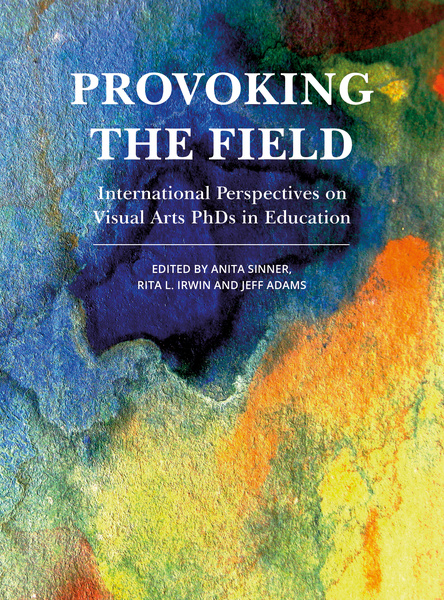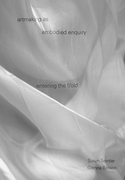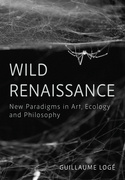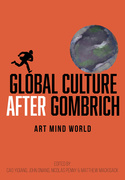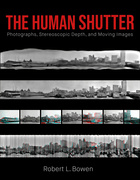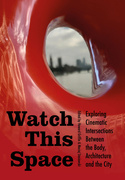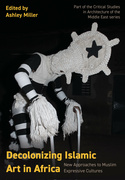Provoking the Field (Book)
International Perspectives on Visual Arts PhDs in Education
Provoking the Field invites debate on, and provides an essential resource for, transnational arts-based scholars engaged in critical analyses of international visual arts education and its enquiry in doctoral research. The book encompasses creative research practices in the visual arts, and advances pedagogical and experimental perspectives, assessments, methodological deliberations and ethical issues and concerns in relation to a host of topic areas in visual arts education.
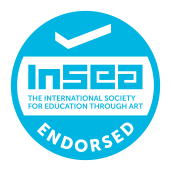
Edition
Provoking the Field invites debate on, and provides an essential resource for, transnational arts-based scholars engaged in critical analyses of international visual arts education and its enquiry in doctoral research. Divided into three parts – doctoral processes, doctoral practices and doctoral programmes – the volume interrogates education in both formal and informal learning environments, ranging from schools to post-secondary institutions to community and adult education.
This book brings together a global range of authors to examine visual arts PhDs using diverse theoretical perspectives; innovative arts and hybrid methodologies; institutional relationships and scholarly practices; and voices from the field in the form of site-specific cases. A compendium of leading voices in arts education, Provoking the Field provides a diverse range of perspectives on arts enquiry, and a comprehensive study of the state of visual arts PhDs in education.
Anita Sinner is a Professor of Art Education at The University of British Columbia. Her interests include artwork scholarship, international art education, stories as research, and community art education. Previously co-editor of the International Journal of Education Through Art, Sinner is also author of Unfolding the Unexpectedness of Uncertainty: Creative Nonfiction and the Lives of Becoming Teachers (2013), and co-author of several titles, including A Heart of Wisdom: Life Writing as Emphatic Inquiry (2012), and Creating Together: Participatory, Community-Based and Collaborative Arts Practices and Scholarship across Canada (2015).
Rita L. Irwin is a distinguished university scholar and professor of art education in the Department of Curriculum and Pedagogy at the University of British Columbia in Vancouver. She was also principal editor for the International Journal of Education Through Art, and is the recipient of several esteemed awards, including Canadian Teacher of the Year, Elliot Eisner Lifetime Achievement Award and Ted T. Aoki Award for Distinguished Service. Irwin has co-edited well-known titles, such as Revisions: Readings in Canadian Art Teacher Education and Being with A/r/tography
Jeff Adams is professor of education at the University of Chester, and the principal editor of the International Journal of Art & Design Education, as well as programme leader of RECAP, a centre for research into creativity.
Introduction
Part 1: Provoking Doctoral Processes
Chapter 1: The Knowledge Creation Spectrum
Michael Biggs
Chapter 2" Interpolation and Relationality: Extending the Field through Creative Arts and Indigenous Research Approaches
Estelle Barrett
Chapter 3: Transformative Interventions: Creative Practices in an Education Doctorate Programme
Jeff Adams and Emma Arya-Manesh
Chapter 4: Art-Based Action Research: Participatory Art Education Research for the North
Timo Jokela, Maria Huhmarniemi and Mirja Hiltunen
Chapter 5: Researching the Unknown through Arts-Based Research to Promote Pedagogical Imagination
Fernando Hernández-Hernández
Chapter 6: Taking Shape: Visual Appearance and Theory
Brooke Hofsess, Karina Riddett and Richard Siegesmund
Part 2: Provoking Doctoral Practices
Chapter 7: When is a Red Shoe not a Red Shoe? Conceptual Framing and the Consequences for the 'Object' in Virtual Research
Barbara Bolt
Chapter 8: How Can Artistic Research (Still) Be Disruptive?
Natalia Calderón
Chapter 9: Artmaking as Entanglement: Conceptualising Agency through a Diffractive Methodology
Ramya Ravisankar
Chapter 10: A/R/Tographic Rhythm: Opening Conversations of Resistance and Accommodation as Scholarly Provocation
Anita Sinner, Verónica Sahagún Sánchez, Jennifer Wicks and Darlene St. Georges
Chapter 11: To Reach the Unreached: Rhythms of Issues, Reflections, Writings and Art Practices
Jo Chiung Hua Chen
Chapter 12: Artistic Event as Pedagogy
Belidson Dias and Tatiana Fernández
Chapter 13: Parsing Creative Influence through Comparative Visual Research Methods
Justin B. Makemson
Chapter 14: Artworks in Residence: Semiosis, Transmediation and ZPD
Julie Wren, Susan Wright and Marnee Watkins
Chapter 15: Connections, Disruptions and Reconfigurations: The Implications of Aesthetic Experience for Doctoral Research in the Visual Arts
Boyd White and April Mandrona
Part 3: Provoking Doctoral Programmes
Chapter 16: Navigating Ethics Protocols for Artistic Research: Strategies for Graduate Student Researchers
Lorrie Blair
Chapter 17: Examining the Case for Artful Participatory Inquiry in the Visual Art Education Doctorate
Kathryn Grushka and Allyson Holbrook
Chapter 8: Some Iberian Perspectives about Arts-Based and Artistic Research in Arts Education
Teresa Torres de Eça and Ângela Saldanha
Chapter 19: Finnish Arts-Based and Artistic Dissertations in Context: Explorations, Interventions and Glocal Interpretations
Mira Kallio-Tavin and Kevin Tavin
Chapter 20: Barrier or Catalyst: Cross-Cultural and Language Issues for Doctoral Researchers in Japan
Toshio Naoe
Chapter 21: A Research Profile of Visual Arts Theses in Education in Turkey
Suzan Duygu Bedir Eristi
Chapter 22: Qualities of Artmaking in Arts-based Educational Research Dissertations
Alison Shields and Rita L. Irwin
Notes on Contributors
Index
'[Provoking the Field] is comprised of a series of case studies that illustrate the wide variety and richness of arts-based research undertaken as part of international doctoral programmes in education. One strength of this publication is the impressive range of nationalities that are included in the book; examples of doctoral programmes are represented from all parts of the globe. It is clear that attempts have been made to avoid an ethnocentric perspective on the subject.
This book will be important to those doctorate students who intend using visual arts methods to explore educational research questions. […] New Ph.D. supervisors would also find Provoking the Field: International Perspectives on Visual Arts PhDs in Education a valuable asset when developing their own supervisory practice.'


